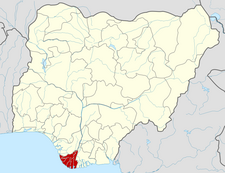Brass, Nigeria
Brass | |
|---|---|
| Coordinates: 4°18′54″N 6°14′30″E / 4.31500°N 6.24167°E | |
| Country | |
| State | Bayelsa State |
| Headquarters | Twon-Brass |
| Government | |
| • Type | LGA |
| Area | |
• Total | 1,404 km2 (542 sq mi) |
| Population (2006 census) | |
• Total | 185,049 |
| Time zone | UTC+1 (WAT) |
| 3-digit postal code prefix | 562 |
| ISO 3166 code | NG.BY.BR |
 | |
Brass is a Local Government Area[1] in Bayelsa State,[2] southern Nigeria.[3] Its headquarters are in the town of Twon-Brass on Brass Island along the coast, it has a coastline of approximately 90 km on the Bight of Bonny.[4] Much of the area of the LGA is occupied by the Edumanom National Forest.
It has an area of 1,404 km2 and a population[5] of 185,049 at the 2006 census.[6]
The postal code of the area is 562.[7] It is a traditional fishing village of the Nembe branch of the Ijo people, it became a slave-trading port for the state of Brass (Nembe) in the early 19th century. It was ruled by African[8] merchant "houses", which were encouraged by the European traders,[9] the state's chief slave-collecting centres (Brass and Nembe) often sent war canoes into the interior—especially through Igbo country—to capture slaves.[10]
Economy of Brass
[edit]Brass has enormous deposits of crude oil and natural gas and because of the rich natural resources[citation needed] has the presence of several national and international oil mining companies. The activities of these oil mining companies has contributed most of the economic development of the Brass area. The Brass people are also known as farmers as Farming is also an important economic activity with crops such as oil palm, plantain, and sugarcane grown in the Brass area. Another economy activities of the Brass to sustain livelihood are Fishing and the making of fishing nets, construction of canoes also is another key economic features of the Brass area.[11]
Climate
[edit]The climate of Brass is tropical monsoon (classification: Am). The district experiences a yearly temperature of 29.05 °C (84.29 °F), which is -0.41% colder than the average for Nigeria. About 244.95 millimeters (9.64 inches) of precipitation and 300.37 wet days (82.29% of the time) are experienced annually in Brass.[12][13]
Notable people
[edit]- Kingsley Akpososo (born 1990), footballer
References
[edit]- ^ "Nigeria: Administrative Division (States and Local Government Areas) - Population Statistics, Charts and Map". www.citypopulation.de. Retrieved 2022-03-09.
- ^ "Bayelsa State". BBC News Pidgin. Retrieved 2022-03-06.
- ^ Mfonobong, Daniel (2020-06-29). "Bayelsa State: List of Local Government Areas & Towns". Nigerian Infopedia. Archived from the original on 2021-09-15. Retrieved 2021-09-15.
- ^ "Local Government Areas in Bayelsa | AllNigeriaInfo". Retrieved 2021-09-16.
- ^ "population | Definition, Trends, & Facts | Britannica". www.britannica.com. Retrieved 2022-03-06.
- ^ "census | Facts, Definition, Methods, & History | Britannica". www.britannica.com. Retrieved 2022-03-09.
- ^ "Post Offices- with map of LGA". NIPOST. Archived from the original on 2009-10-07. Retrieved 2009-10-20.
- ^ "Africa | History, People, Countries, Map, & Facts | Britannica". www.britannica.com. Retrieved 2022-03-06.
- ^ Gertzel, Cherry (July 1962). "Relations between African and European Traders in the Niger Delta 1880–1896". The Journal of African History. 3 (2): 361–366. doi:10.1017/S0021853700003261. ISSN 1469-5138. S2CID 154994315.
- ^ "Brass | Nigeria". Encyclopedia Britannica. Retrieved 2021-09-18.
- ^ "Brass Local Government Area". www.manpower.com.ng. Retrieved 2021-09-15.
- ^ "Brass, Bayelsa, NG Climate Zone, Monthly Averages, Historical Weather Data". weatherandclimate.com. Retrieved 2024-08-08.
- ^ "Brass, Nigeria Weather Conditions | Weather Underground". www.wunderground.com. Retrieved 2024-08-08.

